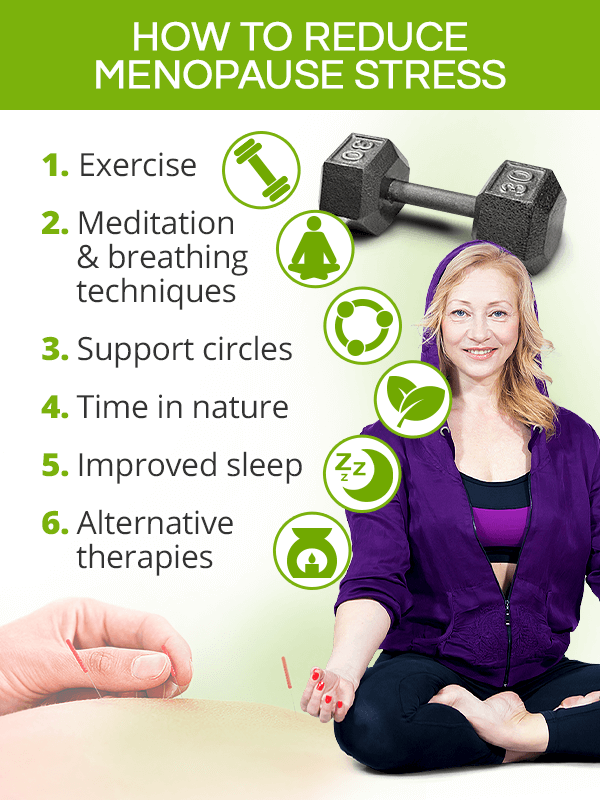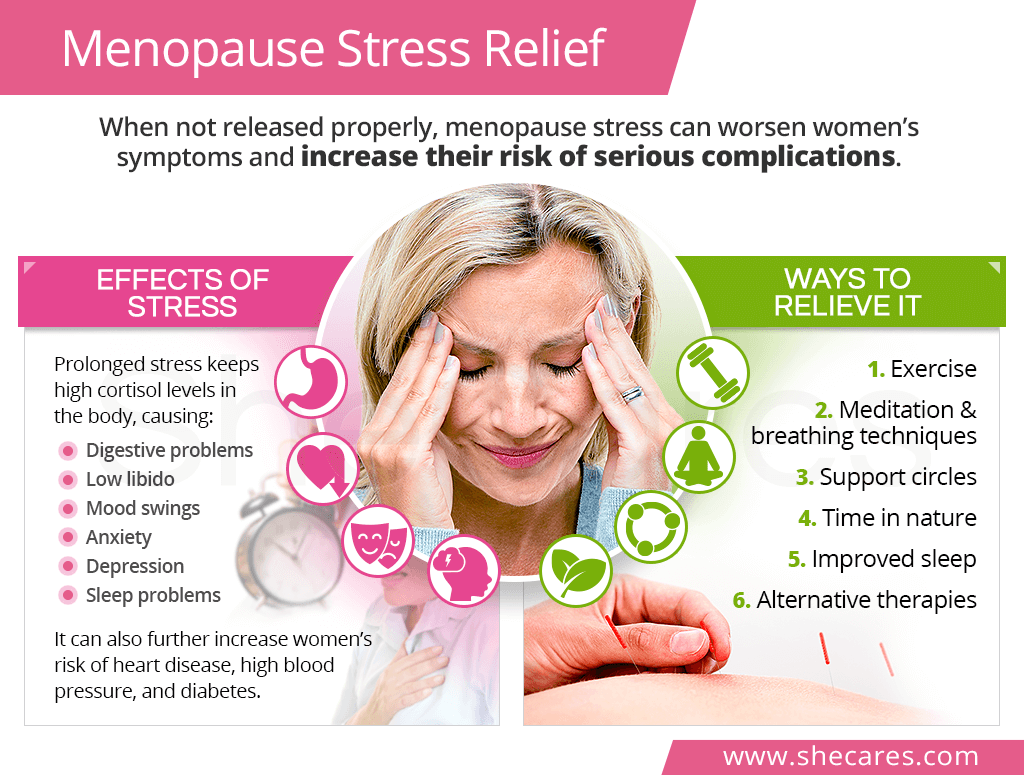About Stress
Most people have a slightly erroneous understanding of what stress is, assuming that, by default, it is something harmful. Stress, however, is beneficial for us as long as it is properly managed.
So, What is Stress?
What we call stress is the body's natural reaction to a change or a challenging situation. Known as the “fight-or-flight” mode, it is designed to keep us safe, engaged, or productive.
In such situations, the body releases several hormones, including cortisol. This sharpens our alertness, tenses the muscles, and increasing heart rate, helping us manage the problem on hand. Once it is resolved, the body returns to its normal state.
However, stress becomes problematic when it is chronic, which means that it is not properly released.
Effects of Prolonged Stress on Menopausal Health
Chronic stress keeps the body in that activated stress mode with elevated cortisol levels, even when stressors are not present. This wreaks havoc in the body, causing hormonal imbalance and a wide range of physical and emotional symptoms:
Coincidentally, all of these discomforts are commonly experienced during the transition. Prolonged stress can worsen menopause symptoms and make women less capable of dealing with them.
Stress has also been identified as a significant risk factor for early menopause.1 Moreover, it can lead to the development of heart disease, high blood pressure, and diabetes, the risk of which is already higher in menopausal women.2
How to Reduce Menopause Stress

Fortunately, there are numerous ways to effectively relieve stress during menopause and take care of one's mental health throughout the transitional stages. Consider the following approaches:
Exercise Regularly
Regular physical activity is highly beneficial for mental and physical health. It helps counteract negative effects of stress, promotes relaxation, and triggers the release of mood-regulating chemicals. The best thing about it is that every woman can find the form of exercising she enjoys most, whether it be out- or indoors, alone, or with a group of friends.
Try Meditation and Breathing Techniques
Meditation and conscious breathing are some of the most commonly recommended approaches for stress relief, and for good reason. They not only promote a sense of calm, but also help the mind focus on the present moment and become more aware of destructive thoughts. When practiced regularly, they can also help manage many menopause symptoms.
Find a Support Circle
Another great way to reduce menopause stress is having a strong support network, especially if it includes other women going through the menopausal transition. Having someone to talk to, learn from, and share one's difficulties with can help women become stronger and equip them with tools to deal with stress and midlife challenges more empowered.
Spend Time in Nature
Studies have shown that spending time in nature can effectively reduce cortisol levels in the body.3 It has been also shown that grounding - such as walking barefoot on grass - can lower stress levels and improve sleep, among other benefits.4 Spending time in nature can consist of exercising outdoors, going for a long hike, or doing some gardening around the house.
Improve Your Sleep
Sleep is one of the best and most natural ways to relieve stress and give the body a chance to restore itself. Getting a good night's sleep can also improve women's mood and cognitive skills, including better memory and concentration. While adults are recommended to sleep between seven to nine hours per night, it is key to keep in mind one's own needs as well.5
Consider Alternative Therapies
Whether it is acupuncture, aromatherapy, massage therapy, or foot reflexology, these alternative therapies for menopause can be highly beneficial for reducing accumulated menopause stress and promoting calm. Some of them might also help reduce both physical and emotional symptoms of menopause, including hot flashes and anxiety.
When to Seek Help
Without a doubt, the aforementioned techniques for relieving menopausal stress can be beneficial if practiced consistently. However, it is key be observant in case prolonged stress gets out of control and begins to deteriorate one's health.
Although everybody's reaction and tolerance to stress is different, good indications that it is time to seek help may include intense physical symptoms that do not go away or increase in frequency, in addition to psychological symptoms that affect daily functioning.
Help can be found through one's healthcare provider, local support groups, and free hotlines. Even reaching out to a friend or a family member can be a great start on the path to well-deserved relief.
Key Takeaways
It is not a secret that stress has become a part of our daily lives, even more so when one is battling the hormonal fluctuations and unpleasant symptoms that come with menopause. As much as short-term stress is beneficial, leaving stress to accumulate in the body can have serious repercussions on women's health. High cortisol levels that ensue can not only worsen menopause symptoms, but also increase the risk of health conditions, like heart disease. Luckily, there are many ways to relieve menopause stress on a regular basis, ranging from exercising, meditating, and trying other alternative therapies to finding a support circle, spending time out in nature, and improving one's sleep routine.
Sources
- Harvard Health Publishing. (n.d.). Menopause and mental health. Retrieved April 21, 2021 from https://www.health.harvard.edu/womens-health/menopause-and-mental-health
- Hormone Health Network. (2018). What is Cortisol? Retrieved April 21, 2021 from https://www.hormone.org/your-health-and-hormones/glands-and-hormones-a-to-z/hormones/cortisol
- Mayo Clinic. (2020). Exercise and stress: Get moving to manage stress. Retrieved April 21, 2021 from https://www.mayoclinic.org/healthy-lifestyle/stress-management/in-depth/exercise-and-stress/art-20044469
- Mayo Clinic. (2020). Meditation: A simple, fast way to reduce stress. Retrieved April 21, 2021 from https://www.mayoclinic.org/tests-procedures/meditation/in-depth/meditation/art-20045858
- The North American Menopause Society. (n.d.). Stress: Getting Serious About Solutions. Retrieved April 21, 2021 from https://www.menopause.org/for-women/menopauseflashes/mental-health-at-menopause/stress-getting-serious-about-solutions
- Society for Endocrinology. (2019). Cortisol. Retrieved April 21, 2021 from https://www.yourhormones.info/hormones/cortisol/
Footnotes:
- Korean Journal of Family Medicine. (2015). The Association between Stress Level in Daily Life and Age at Natural Menopause in Korean Women. Retrieved April 21, 2021 from https://www.ncbi.nlm.nih.gov/pmc/articles/PMC4666866/
- National Institute of Mental Health. (n.d.). 5 things You Should Know About Stress. Retrieved April 21, 2021 from https://www.nimh.nih.gov/health/publications/stress/index.shtml
- Harvard Health Publishing. (2019). A 20-minute nature break relieves stress. Retrieved April 21, 2021 from https://www.health.harvard.edu/mind-and-mood/a-20-minute-nature-break-relieves-stress
- Journal of Inflammation Research. (2015). The effects of grounding (earthing) on inflammation, the immune response, wound healing, and prevention and treatment of chronic inflammatory and autoimmune disease. Retrieved April 21, 2021 from https://www.ncbi.nlm.nih.gov/pmc/articles/PMC4378297/
- Sleep Foundation. (2021). How Much Sleep Do We Really Need? Retrieved April 21, 2021 from https://www.sleepfoundation.org/how-sleep-works/how-much-sleep-do-we-really-need
